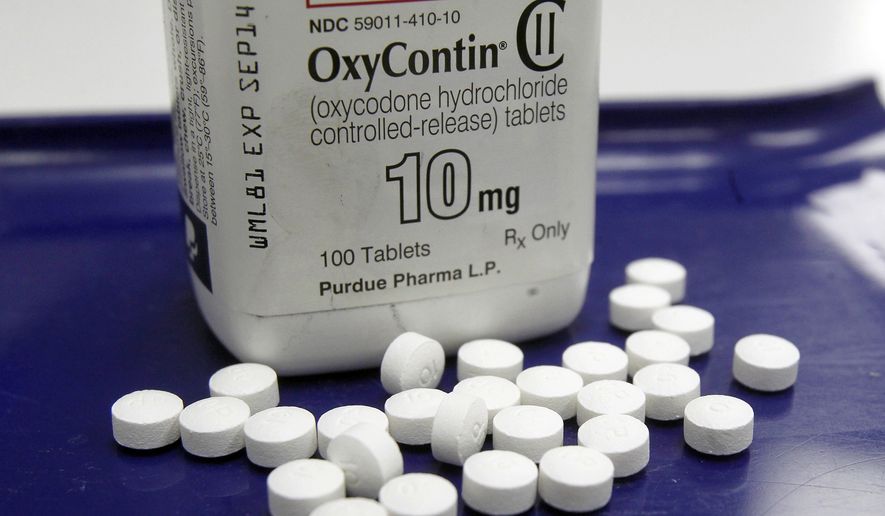House lawmakers threatened to subpoena the Drug Enforcement Administration on Wednesday, saying their patience is “wearing thin” as they seek information about who supplied millions of pain pills to hard-hit West Virginia.
Energy and Commerce Committee Chairman Greg Walden said he’s been waiting for the DEA to name the companies for six months. He said the delay is unacceptable, given the extent of the opioid crisis and Congress’ scramble to respond.
“I’m going to be very blunt: my patience is wearing thin. Our requests for data from the DEA are met with delay, excuses and, frankly, inadequate response. People are dying. Lives and families are ruined,” Mr. Walden said he told Neil Doherty, a deputy assistant DEA administrator who testified before the panel Wednesday.
“It is time for DEA to get this committee the information we need, and to do it quickly,” the chairman said. “No more dodges. No more delays.”
Rep. Joe Barton, Texas Republican, threatened to “bring the wrath of this committee down on DEA.”
“If I were you I would go back, get the answers in plain English as quickly as possible,” he told Mr. Doherty.
Mr. Doherty said his agency is trying to provide answers to the agency on a rolling basis and will “make every effort” to relay the rest of the requested information.
Wednesday’s hearing focused the federal government’s response to an opioid epidemic that, according to estimates, killed more than 60,000 people last year.
Though five officials testified, the DEA has been front and center of late.
A high-profile report by the Washington Post and CBS’s “60 Minutes” said an industry-friendly 2016 law made it “virtually impossible” for the DEA to suspend orders of narcotics that could fall into the hands of corrupt doctors or illicit pharmacies.
Yet the DEA sharply reduced the number of suspension orders against opioid manufacturers even before Congress passed the measure that has been blamed for the drop, a Democratic sponsor of the embattled law said Wednesday.
Rep. Peter Welch, Vermont Democrat, said immediate-suspension orders dropped from 65 in 2011 to five in 2015, before rising to nine in 2016 — the year that Congress passed its controversial law.
He said Congress passed the law “after there had been already a decline in the use of that tool — one of many tools — by the DEA.”
“That is absolutely correct, sir,” said Neil Doherty, deputy assistant administrator at the Drug Enforcement Administration.
Yet chief DEA Administrative Law Judge John J. Mulrooney II, in a forthcoming law review article, says the law will hamstring the agency, while allowing companies to submit “corrective action” plans before being penalized.
Revelations about the law have sparked a firestorm on Capitol Hill. Though the bill breezed through both chambers, lawmakers said they thought the bill amounted to a crackdown on opioid manufacturers, rather than raising the threshold for a suspension order.
Democratic lawmakers have called for the law to be repealed, and Rep. Tom Marino — Pennsylvania Republican who pushed the 2016 law — withdrew his name from consideration to lead Mr. Trump’s drug-control policy office.
Sen. Orrin Hatch, a Utah Republican who negotiated the final version of the bill, has criticized the overall findings of the investigative report.
He said the law clarified standards around suspension orders so legitimate patients would not suffer, and that DEA officials didn’t object to the final version.
The Post report said DEA officials rolled over and accepted the best deal they could get out of Congress.
Since its publication, Deputy Attorney General Rod Rosenstein has said the Justice Department intends to review the law.
Though Mr. Welch cast doubt on assumptions about the law’s impact, he said the report underscored his concern about the opioid problem and whether the DEA has the tools it needs.
“We want to do everything we can to stem the tide of illegal opioids and we want to pass legislation that by no means handcuffs the ability of your organization to do its job,” he told Mr. Doherty.
He also said the outlets that investigated the 2016 law were “both respected journalistic organizations.”
Mr. Walden said the real question is why the DEA’s rate of suspension orders dropped so significantly during the height of the opioid epidemic — whether it was an agency decision or some other factor.
Rather than posing the question directly to Mr. Doherty, he moved on, saying extracting an answer may be impossible after the agency failed to provide data about its investigation in West Virginia.
Mr. Walden wants to know which company supplied a pharmacy in the town of Kermit that received 9 million opioid pills in just two years, and who supplied a pharmacy in Oceana with 600 times the amount of oxycodone pills that a comparable pharmacy, just six blocks away, received.
Rep. Ryan Costello, Pennsylvania Republican, later asked if there was a significant policy change that would have resulted in the change.
“Not to my knowledge, sir,” Mr. Doherty said.
Mr. Costello also noted that the overall number of opiates manufactured and distributed since the passage of the bill has actually decreased.
Mr. Doherty said the law “did not stop DEA from doing its job in the diversion space.”
Yet questions about the 2016 law competed for airtime Wednesday with the committee’s investigation into the number of pills that flooded West Virginia.
“To me this is a pretty basic question — who are the suppliers?” Mr. Walden said.
• Tom Howell Jr. can be reached at thowell@washingtontimes.com.




Please read our comment policy before commenting.